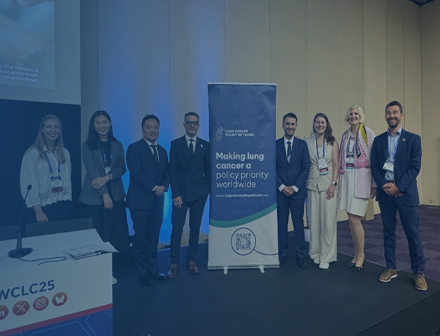To coincide with Lung Cancer Awareness Month and expand on the findings of last year’s report Increasing the earlier detection of lung cancer: a toolbox for change, the Lung Cancer Policy Network hosted a webinar on 19 November: Detecting lung cancer earlier: the need for effective national strategies.
The Network’s panel of experts focused not only on LDCT screening but also on additional approaches, including the management of incidental pulmonary nodules; targeted lung cancer checks; raising awareness; and prioritising lung cancer in policy. These approaches are crucial in improving the earlier detection of lung cancer, especially in settings where LDCT screening may not have yet been comprehensively implemented.
Dr Mattias Johansson of the International Agency for Research on Cancer spoke about epidemiological trends, including changing risk profiles globally; Tiffany Gowen, Director of the Commission on Patient- and Family-Centered Care, in the US, discussed educational materials and awareness-raising efforts, with a particular focus on the importance of the annual National Lung Cancer Screening Day on 12 November; and Dr Luis Raez of the Memorial Cancer Institute, also in the US, discussed the value of AI in interpreting IPNs.
Professor Pan-Chyr Yang spoke about the burden of lung cancer in Asia and looked at preliminary results from the Taiwan National Lung Cancer Early Detection Program. Alongside inclusion criteria based on age and smoking status, those with a family history of lung cancer are also eligible for screening based on the findings from the TALENT study.
Lauren Pretorius, CEO of the Campaigning for Cancer organisation in South Africa, discussed gaps in the country’s cancer pathway, including lack of awareness, challenges in access, and inadequate specialist diagnostic services.
Dr Lucia Viola, a pulmonologist at the Fundación Neumológica Colombiana, in Bogotá, spoke about how Latin American countries approach screening, and about the value of upskilling primary care physicians. And finally, Professor John Field of the University of Liverpool provided an overview of the progress and impact of the UK’s Targeted Lung Health Check programme.
During the Q&A, speakers offered insights into the overall policy landscape and discussed the need to more precisely identify high-risk individuals, including among people who have never smoked. There was also an overall call to prioritise lung cancer and early detection as a policy priority. Lastly, our speakers highlighted that while improving early screening should be a priority globally, interventions will only be successful with strong local engagement and action.
Thank you to those who were able to join us, and a particular thanks to our wonderful speakers!
Recent news
Blog

Insights from WCLC 2025
At the World Conference on Lung Cancer in Barcelona, the Network hosted a very well-attended panel discussion focusing on the latest developments in lung cancer policy.
Case study

The screening programme for lung cancer in the Canadian province of British Columbia
We explore how a regional screening programme has been established throughout British Columbia.
News

Event to address lung cancer screening implementation in Central and Eastern Europe
On 16 September, the Network and the Croatian National Lung Cancer Screening Program will be hosting an in-person event.
